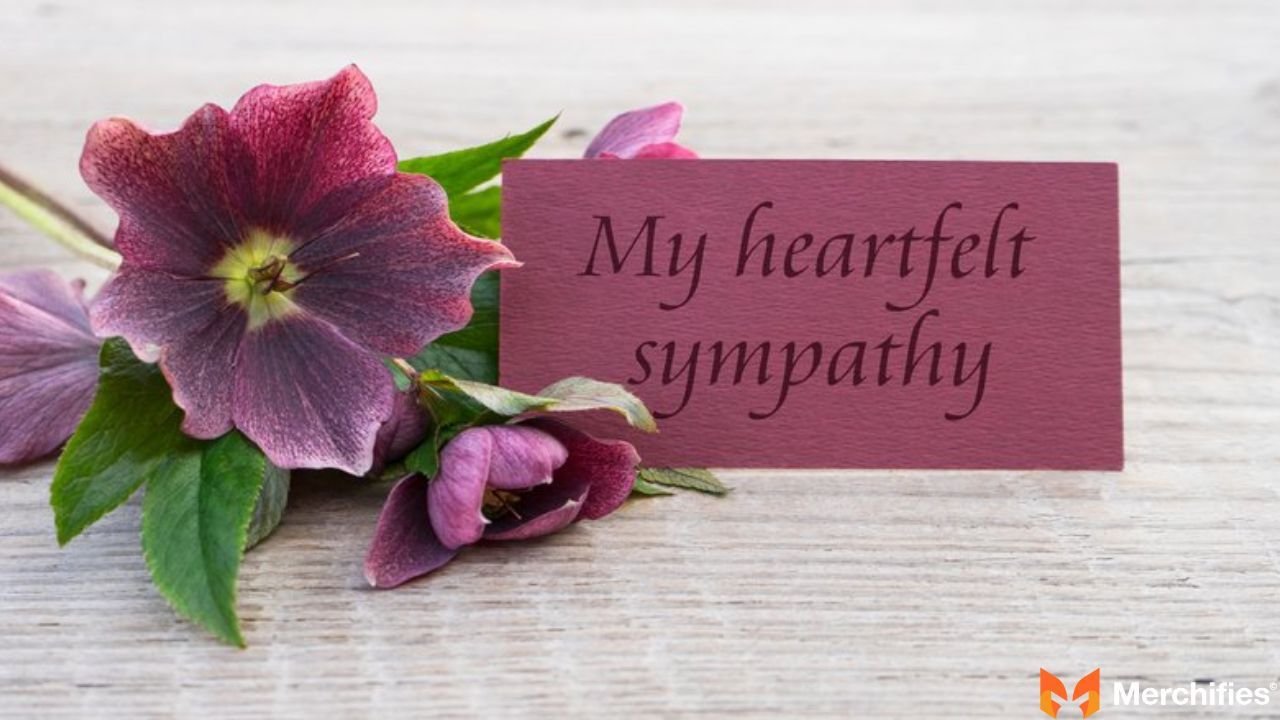-da0801079a650a2e.jpeg)
105+ Short Sympathy Messages for Cards: Simple & Meaningful (2026)
This compassionate guide shares 105+ thoughtful ways to express sympathy and support during times of loss, providing numerous examples of sympathy messages. Whether you’re writing a condolence card, message, or note, you’ll find heartfelt words that offer comfort, respect, and genuine care to grieving families and loved ones.

Blog Post Contents
The truth is, many people struggle with condolence communication because they fear saying the wrong thing. A study by the National Funeral Directors Association (NFDA) found that over 60% of individuals feel uncomfortable writing sympathy messages. However, research from the American Psychological Association shows that any sincere expression of support can provide meaningful comfort during bereavement. This comprehensive guide will equip you with 105+ carefully crafted sympathy messages designed for every type of loss, along with expert insights on grief communication that actually helps.
Whether you're writing a sympathy card for a colleague, supporting a friend through sudden loss, or reaching out to a family member experiencing unimaginable grief, these messages will help you express your condolences with authenticity and compassion.
Understanding the Power of Sympathy Messages
Sympathy messages act as vital emotional bridges, especially in the isolating experience of grief. Studies show that bereaved individuals often report feelings of disconnection (Bowlby, 1969). A thoughtful condolence message combats this, reminding them they're not alone. According to a study by the American Psychological Association, receiving genuine sympathy validates emotions and reinforces their support network. These messages often become cherished keepsakes, reread during difficult times for comfort and connection. For example, a message like, "Thinking of you and your family during this difficult time. Please know that I'm here if you need anything at all, whether it's a shoulder to cry on or help with errands," provides immediate support. The most effective messages acknowledge the loss, express genuine care, and offer ongoing support. Timing is crucial; immediate responses show care, while follow-up messages weeks or months later demonstrate lasting compassion. Consider sending a handwritten note initially, followed by a check-in text a month later.
What to Say Instead of "My Condolences"?
The phrase "my condolences" can sometimes feel stiff or distant. If you want to sound more genuine and personal, try these heartfelt alternatives:
- "I’m here for you." (Simple and supportive)
- "My heart is with you." (Emotional and warm)
- "I don't have the right words, but I care about you." (Honest and vulnerable)
- "I’m holding you in my heart." (Gentle and comforting)
- "Please know I’m thinking of you and your family." (Respectful)
Short Sympathy Messages for Cards (Simple & Concise)
Sometimes, less is more. When you don't have much space in a card or want to send a quick text, these short sympathy messages express your care without overwhelming the grieving person.
For Quick Text/SMS or Flowers
- "Thinking of you and wishing you moments of peace and comfort."
- "I am so sorry for your loss. My heart goes out to you."
- "Holding you close in my thoughts and hoping you are doing okay."
- "With deepest sympathy as you remember [Name]."
- "Sending you love and strength in this time of loss."
- "Gone from our sight, but never from our hearts."
Professional Condolences for Coworkers (Formal)
Writing to a boss or colleague requires a balance of warmth and professionalism. These messages are appropriate for the workplace.
- "Please accept my deepest condolences for your family's loss."
- "Wishing you peace and comfort during this difficult time. My thoughts are with you."
- "We are thinking of you and your family as you celebrate [Name]’s remarkable life."
- "I was saddened to hear of your loss. Please know that the team is thinking of you."
- "With heartfelt sympathy on the passing of your [Mother/Father]."
Essential Condolence and Bereavement Messages for General Loss
Sometimes, the most powerful sympathy message uses simple, heartfelt language that speaks directly to the human experience of loss. These foundational messages work across various relationships and circumstances, providing a solid starting point for your condolence communication.

General Sympathy Messages:
- "I'm so sorry for your loss, and may the happy memories of your loved one stay with you always."
- "Please accept our heartfelt condolences during this difficult time. Our thoughts and prayers are with you."
- "May the peace that comes from loving memories of (Name) comfort you now and in the days ahead."
- "With deep sympathy, we mourn along with you at this trying time."
- "We hope that fond memories will help to ease your pain and bring a measure of peace and comfort to those who are grieving."
- "Wishing you courage, comfort, strength, and faith during this challenging time of mourning for your beloved one."
- "In such a sensitive moment as this, we just want to express our condolences and let you know that we are here for you."
- "May God provide the strength and courage necessary for you to get through this tough time. Our deepest sympathies go out to you and your family."
These messages work because they focus on universal themes of memory, comfort, and ongoing support. Additionally, they avoid clichés while acknowledging both the immediate pain and the hope for future healing.
How to Write a Short Condolence Message (3 Steps)
Struggling to put pen to paper? You don’t need to be a poet. Just follow this simple 3-step formula to write a perfect sympathy note:
1. Acknowledge the Loss: Start by mentioning the deceased by name or referring to the loss directly.
- Example: "I was so sorry to hear about the passing of your father."
2. Express Your Sympathy: Share your feelings or a brief memory.
- Example: "He was a wonderful man, and I’m thinking of you during this tough time."
3. Offer Support (Optional): End with a genuine offer to help or a warm closing.
- *Example: "I’m here if you need anything at all. With love, [Your Name]."
Expressing Genuine Appreciation During Grief
When writing a sympathy message for someone who has significantly impacted your life, expressing appreciation becomes crucial for honoring both the relationship and the deceased. These messages work particularly well for mentors, close friends, or family members who have shown exceptional kindness.
Appreciation-Based Sympathy Messages:
- "You have always been there for me, even when I didn't deserve it. I am so grateful for your kindness and support."
- "As we go through life together, thank you for being a friend who truly understands me and knows what I need before I do."
- "I cherish all the memories we have made together over the years; they make me so grateful for our friendship."

- "I am so thankful to have you in my life; you are a source of strength and love that I can always rely on."
- "Thank you for all the times you listened, were there for me and didn't judge me. I am blessed to have such an amazing companion by my side throughout life's journey."
- "Your generosity is incredible; thank you for being willing to help out whenever I need it!"
- "You have been my rock through tough times, and I will never forget your kindness or support. Thank you from the bottom of my heart."
- "Your love and kindness have been my saving grace. I'm so grateful for everything you do for me."
- "Words can't express how thankful I am to have someone like you in my life. You are an amazing friend!"
These appreciation messages serve a dual purpose: they provide comfort while celebrating the positive impact of relationships. Furthermore, they remind the grieving person of their own worth during a time when self-doubt often emerges.
Offering Genuine Support Through Sympathy Messages
One of the most meaningful aspects of any sympathy message involves offering concrete support rather than empty platitudes. Based on my experience counseling bereaved families, I've observed that specific offers of help provide more comfort than general statements of availability.
Support-Oriented Sympathy Messages:
- "My thoughts are with you during this difficult time. If there is anything at all I can do to help, please don't hesitate to let me know."
- "Words cannot express my sorrow for what has happened. Know that I am here if you need anything - even just someone to talk to who will listen without judgment."

- "My heart goes out to you on this day of sorrow and grief, and if there is any way I can be of assistance, please let me know."
- "I am deeply sorry for you and your family's loss. I know this will be a difficult time, so please remember that I'm here to help in any way I can."
- "Your loss is felt by us all, and my condolences go out to you during this dark time. If there is anything I can do to help, please don't hesitate to ask."
- "I am at a loss for words right now, but want you to know that we are here for you during this trying period if there is any way we can lend a helping hand."
- "My thoughts are with you and your family during this hard time. Please know that I am available to help with anything you may need, no matter how small."
- "My heart goes out to all of you in this time of grief. If there is any way I can be of comfort or assistance, please don't hesitate to reach out to me."
The key to effective support sympathy messages lies in their specificity and follow-through. Rather than saying "let me know if you need anything," consider offering specific help like meal preparation, childcare, or household tasks.
Compassionate Follow-Up Sympathy Messages
Grief doesn't end with the funeral service, yet many people stop reaching out after the initial period of loss. However, some of the most meaningful sympathy messages arrive weeks or months later, when the initial shock has worn off and the reality of permanent loss sets in.
Follow-Up Sympathy Messages:
- "You are constantly on my mind and in my heart. No matter the outcome of searching for answers, please know that I'm here for you and will be with you every step of the way."
- "It's been some time since we first started this journey together and things may seem bleak at times; however, please remember how much strength you truly possess as you continue down this path searching for answers."
- "My thoughts are with you as we go through this journey together - I'm here to listen and provide comfort if you ever need someone to talk to."

- "Sending my love and support as you look for closure or answers during this difficult time. Let me know how I can help in any way."
- "You are a strong person, and I admire your resilience in continuing the search for answers and understanding. If there's anything I can do to help, please let me know - I'm here for you always."
- "Although it is hard, never give up hope - don't forget that you have many people who care about you and are willing to be by your side through this journey of finding closure or answers."
- "Your determination is admirable, and I'm here to provide support and strength in any way that I can. Please don't hesitate to reach out if you need someone to talk to or a shoulder to lean on."
- "My thoughts are with you during this difficult time, as we continue searching for answers together - don't forget that I'm by your side and here for you when needed."
These follow-up sympathy messages acknowledge the ongoing nature of grief while reinforcing your commitment to long-term support. Moreover, they validate the bereaved person's continuing struggle without imposing timelines for "moving on."
Condolence Messages for Sudden and Unexpected Loss
When death arrives without warning, the shock can be overwhelming for everyone involved. Crafting a sympathy message for sudden loss requires extra sensitivity, as the bereaved may still be processing the reality of what happened.
Sudden Loss Sympathy Messages:
- "No words can express the sorrow that we feel for your sudden loss. Our thoughts are with you and your family during this difficult time."
- "May God grant you the strength and courage to cope with this sudden loss of your loved one."
- "Your loved one will always be in our hearts, even though they left us too soon."
- "We hope the love of those around you gives you strength and comfort as you face this sudden pain and grief together; we are here to help in any way possible."

- "The death of someone so special leaves a deep wound in our hearts; may your memories bring you peace and solace during these dark days ahead."
- "Our thoughts and prayers are with your family during this difficult time. We hope you will find the strength to keep going in the face of such a sudden loss."
- "May God hold your loved one close in His arms and give their soul rest, and may He also grant you solace in knowing that they are now in a better place."
- "This is an incredibly hard moment for you, and we wish we could take your pain away; please know that our hearts break alongside yours as we mourn together at this sad time."
- "No amount of words can express how sorry we are for the loss of someone so dear to us; may peace be found in the fond memories that were shared between your loved one and the family."
- "Our collective hearts are heavy with sadness as we remember this special person; may God be your comfort and strength during this time of need."
Sudden loss messages should acknowledge the shock factor while providing stable emotional support. Additionally, they often benefit from religious or spiritual language, as many people find comfort in faith during inexplicable tragedies.
Sensitive Sympathy Messages for Suicide Loss
Writing a sympathy message for suicide loss requires exceptional care and sensitivity. Families dealing with suicide often struggle with complex emotions including guilt, anger, and confusion alongside their grief.
Suicide Loss Sympathy Messages:
- "My deepest sympathies go out to you during this difficult time. I am so sorry for your loss and am sending my love and support."
- "I hope that you find comfort in knowing how much your loved one was appreciated and cherished by all who knew them."
- "Your loved one will always be remembered and thought of fondly. Please accept my condolences on your loss."
- "My heart goes out to you in this sad time, and I am here if you need anything at all."
- "I can't even begin to imagine the sorrow that you are feeling now, but please know that I am thinking of you with great sympathy and compassion during this difficult time."

- "Words are inadequate for times like these, but please know that you have been in my thoughts since hearing about the death of your loved one."
- "Your loss is felt by all of us and we are here to support you in any way that we can."
- "My heartfelt condolences go out to you during this very difficult period in your life. You have our deepest sympathy and love."
- "May the peace and understanding that comes from friends and family help you through these dark times."
- "Though I cannot begin to comprehend the pain that you are experiencing right now, please know that I am here for you if ever you need someone to talk to or just a shoulder to cry on."
When addressing suicide loss, avoid any language that could be interpreted as judgment. Instead, focus on love, support, and the positive memories of the deceased person's life.
Sympathy Messages When You Cannot Attend Services
Sometimes circumstances prevent us from attending memorial services, but this doesn't diminish our desire to offer support. A thoughtful sympathy message can bridge the physical distance and show that geography doesn't limit compassion.
Absence Sympathy Messages:
- "I am so sorry that I cannot be there with you during this difficult time. Please know that my thoughts and prayers are with you and your family."
- "Although I cannot be at the memorial service, please know that I am thinking of all of you and holding you in my heart."
- "My deepest sympathies on the loss of your loved one. You are in my thoughts and prayers even though I'm not able to be there in person."

- "My heart aches for you and your family. I hope that the memories of your loved one bring you comfort in this time of sorrow."
- "I am sending love and prayers from afar. May you find strength in knowing that so many people are thinking of you during this difficult time."
- "I am deeply sorry for your loss. Please know that my thoughts are with you even if I cannot be there to offer support in person."
- "Sending love and peace to you during this tough time. My heart is with all of you, though I'm not able to attend the memorial service."
- "My sincerest condolences on the passing of your loved one. I will be keeping all of you in my thoughts and prayers."
These messages acknowledge the physical absence while emphasizing emotional presence. Furthermore, they can be particularly meaningful when sent both before and after the service, showing ongoing support.
Heartfelt Sympathy Messages for Loss of Parents
Losing a parent represents one of life's most profound transitions, regardless of age. A meaningful sympathy message for parental loss should acknowledge both the unique parent-child relationship and the lasting impact parents have on our lives.
Parental Loss Sympathy Messages:
- "I am so sorry for your loss. Your parent was an incredible person who will be deeply missed."
- "My thoughts and prayers are with you during this difficult time. May your parent rest in peace!"
- "Words cannot express the sorrow I feel for you at this time of loss. Know that my heart is with you and your family."

- "Your parent will never be forgotten, and their memory will live on in our hearts forever."
- "It is hard to say goodbye, but we can find comfort in knowing that our loved ones have gone on to a better place."
- "May the light of your parent's memory be a source of strength and comfort for you during this time."
- "Your parent was wonderful person who will be greatly missed. My condolences to you and your family."
- "I am here if you need anything, or just someone to talk to. You are not alone in this difficult time."
- "My deepest sympathies go out to you on the passing of your parent. May they rest in peace."
- "This is a sad time for all of us, but know that your parent will live on in our hearts forever."
Parental loss messages work best when they celebrate the parent's life while acknowledging the profound void their absence creates. Additionally, these messages should recognize that grief for parents often involves complex emotions about independence and life transitions.
Compassionate Messages for Loss of Spouse or Partner
The death of a spouse or life partner creates a unique form of grief that affects every aspect of daily life. An effective sympathy message for spousal loss acknowledges both the depth of the relationship and the challenges of rebuilding life alone.
Spousal Loss Sympathy Messages:
- "When you have lost the one you love there is a void that will never be filled, and we are so sorry for your loss."
- "Words cannot truly express our sympathy or convey the depth of our sorrow, but know that we share your pain and hold you close in our thoughts and prayers."

- "Our hearts ache with yours as we remember the life of your partner who was loved by many people and will be deeply missed."
- "Our sincere condolences to you on the loss of someone so special in your life, a true friend and partner whose presence will now only exist in fond memories."
- "May comforting memories bring strength to you during this difficult time, and may you find solace in the knowledge that your partner is now at peace."
- "Please know that we are here for you if you need anything, as no one should have to face such a difficult loss alone."
- "Take comfort in knowing that others are thinking of you and praying for strength during this trying time."
- "Thinking of you with sympathy and wishing you courage during this time of sorrow."
- "May precious memories sustain and guide you through this difficult time, until the day when all pain will be gone forever."
- "We share your sadness in the loss of someone so dear to your heart, but we also send hope that it will soon bring peace and comfort."
Spousal loss messages should acknowledge the unique partnership while offering hope for eventual healing. Moreover, they often benefit from emphasizing community support and practical assistance.
Tender Messages for Loss of a Child
No loss compares to the death of a child, and writing a sympathy message for bereaved parents requires extreme sensitivity and care. These messages should honor the child's life while acknowledging the devastating nature of this unnatural loss.
Child Loss Sympathy Messages:
- "Your child was an angel on this earth, even if only for a short time. Please accept my deepest condolences during this difficult time."
- "I hope that the love you shared with your child will bring you some comfort during this trying time."
- "May all of the wonderful memories of your beautiful child fill your heart and help ease your pain."
- "You may not understand why such things happen, but please know that I'm here for you through it all."
- "The loss of a child is something that no parent should have to endure. May you find peace and strength during this sorrowful time."
- "Your baby was blessed with love, even if only for a brief moment in time."
- "My thoughts are with you and your family as you face this difficult time of grief."
- "Your child may have left this world too soon, but their memory will live on forever in your hearts."

Messages for child loss should be brief and focus on love rather than attempting to provide explanations or comfort that may feel inadequate. Additionally, they should acknowledge the permanence of parental love regardless of the child's age at death.
Compassionate Miscarriage Sympathy Messages
Pregnancy loss often goes unrecognized by society, yet it represents a profound grief experience for expectant parents. A thoughtful sympathy message for miscarriage validates this loss while offering gentle support.
Miscarriage Sympathy Messages:
- "My heart aches for you in this difficult time. Please know that I am here to support you and your family through the grief of losing a baby."
- "Nothing can replace the loss of a little one, but my prayers and thoughts are with you during this sorrowful time."
- "The news of your miscarriage has broken my heart and I want to express my deepest condolences for all that you are going through right now."
- "Losing a baby is never easy, although I hope that remembering your love will bring some comfort to your hearts in these dark times."
- "Please accept my sincerest sympathies and know that I'm here if you need anything at all as you go through this hard time."

- "I am sorry for your loss and my thoughts and prayers are with you during this difficult time."
- "May the love of friends and family help you through the pain and sadness that you are feeling right now."
- "Even though words cannot heal the pain, know that my heart breaks for yours in this difficult time."
- "My sincerest sympathies to you and your family in this heartbreaking time of mourning your little one's passing."
- "Please accept my sincere condolences on the sad occasion of your baby's loss; I'm here if you need anything at all during this tough time."
Miscarriage messages should validate the realness of the loss while avoiding assumptions about future pregnancies or suggestions to "try again." Instead, focus on acknowledging present grief and offering ongoing support.
Sympathy Messages for Loss of a Pet (Dog & Cat)
Losing a furry family member is a unique and profound heartbreak. Acknowledging this bond validates their grief. Here are some touching words for the loss of a beloved dog or cat.

- "So sorry to hear about the loss of your faithful companion. [Pet Name] was such a special part of your family."
- "Pets leave paw prints on our hearts that never fade. Thinking of you."
- "May the fond memories of your beloved [Dog/Cat] bring you comfort during this hard time."
- "It’s not 'just a pet,' it’s a member of the family. Sending you so much love."
- "I know how much [Pet Name] meant to you. They were lucky to have such a loving home."
Supportive Messages for Loss of Friends
Friendship loss often receives less recognition than family death, yet close friends can be chosen family whose absence creates significant grief. An effective sympathy message for friend loss validates this relationship while offering comfort.
Friend Loss Sympathy Messages:
- "I'm so sorry to hear about the loss of your dear friend. Please accept my deepest sympathies and know that I am here if you need anything."
- "It is always heartbreaking when someone close passes away. Please take comfort in knowing that many lives have been touched and made better because of your friend."

- "The world is a little more empty without your friend in it. My condolences are with you during this difficult time."
- "Your grief is understandable and valid, and I am here to help you cope with it in any way I can."
- "I know that what you're going through right now is hard, but let me be the first to remind you that we will all miss your friend's presence dearly."
- "Sometimes people come into our lives for only a brief moment, but leave us with memories that last forever. We will always remember your friend fondly."
- "I can't imagine the pain you're going through, but I want you to know that I'm here for you and my heart breaks for yours."
- "Your friend may no longer be with us physically, but mentally and emotionally they will always remain in our hearts."
Friend loss messages should validate the significance of chosen relationships while acknowledging the unique grief that comes from losing someone who truly understood you.
Perfect Sympathy Card Closings
The way you end a sympathy message can be just as important as how you begin it. These closings provide gentle, appropriate ways to conclude your condolence message while reinforcing your support.
Sympathy Message Closings:
- "With love and sympathy."

- "Thinking of you with heartfelt condolences."
- "Sending hugs of comfort and sympathy."
- "My heart aches for you in your loss."
- "May loving memories bring you peace and solace."
- "Wishing you strength during this difficult time."
- "I am here for whatever you need, now and always."
- "Remembering you and your loved one with love."
These closings work because they're personal without being overly intimate, supportive without being presumptuous, and caring without being overwhelming.
Faith-Based Condolence and Bereavement Messages
For families who find comfort in religious faith, incorporating spiritual elements into your sympathy message can provide additional solace. However, it's important to match the religious tone to the recipient's beliefs.
Religious Sympathy Messages:
- "May the Lord grant you comfort in your time of sorrow and may He be a source of peace in your heart."
- "God promises to heal our brokenness and bring joy even when we feel overwhelmed by sadness. May His love surround you during this time."

- "When we are feeling lost, God is always there to help us find our way back home. I pray that His presence provides solace for you now."
- "I am keeping you in my prayers and asking the Lord for strength to get through this difficult time."
- "God never promised life would be easy, but He does promise to carry us through every storm. May His faithfulness bring you comfort."
- "God sees your sadness and knows the depths of your grief. May He give you strength and courage to face every day."
- "Draw on God's grace and mercy when you need it most. May He give you peace in His presence."
- "God understands our sorrows even when we do not have the words to express them. I pray that He brings comfort to your hurting heart."
- "We must trust God's plan for us, even when life takes an unexpected turn. I am sending thoughts of hope and healing during this sad time."
- "Let us remember that God works in mysterious ways. May He give you peace and comfort during this difficult time."
Religious messages should be used only when you're confident about the recipient's faith background. When in doubt, opt for more universal spiritual language or secular messages of comfort.
What to Avoid in Sympathy Messages
Understanding what not to include in a sympathy message is just as important as knowing what to say. These common mistakes can unintentionally cause additional pain during an already difficult time.

Avoiding Harmful Clichés
Steer clear of phrases like "They're in a better place" or "Everything happens for a reason," as these can minimize the griever's pain. Instead, focus on acknowledging their loss and offering support. Religious Sensitivity: Be mindful of the recipient's beliefs. Avoid overtly religious language unless you know they share your faith. A simple, "I'm thinking of you" is often more appropriate.
Avoiding Comparisons: Do not compare their loss to your own experiences. Each person's grief is unique, and comparisons can invalidate their feelings. Focus solely on their pain and offer your condolences. Inappropriate Timing for Humor: While humor can be a coping mechanism, it's generally best to avoid it in sympathy messages. Keep the tone respectful and somber.
Religious Sensitivity
Not everyone shares the same faith background, and assuming religious beliefs can alienate grieving families. Phrases like "God has a plan" or "God needed another angel" may feel insensitive to those questioning their faith during grief.
When unsure about religious preferences, stick to universal themes of love, memory, and support that transcend specific belief systems.
Avoiding Comparisons
Never compare the recipient's grief to others who have experienced similar losses. Each grief experience is unique, and suggesting that someone else "got through it" can minimize the current pain.
Similarly, avoid sharing your own loss experiences unless specifically asked. While you may intend to show understanding, grief is deeply personal and comparisons rarely provide comfort.
Inappropriate Timing for Humor
While gentle humor might occasionally help in long-term grief support, sympathy messages should maintain a respectful tone. Avoid jokes about the situation or attempts to "lighten the mood" through humor.
Focus instead on genuine expressions of care, support, and remembrance that honor both the deceased and the grieving process.
The Psychology Behind Meaningful Condolence Communication
Understanding the psychological impact of grief helps us craft more effective sympathy messages that truly serve the bereaved. Research in grief psychology reveals that bereaved individuals often experience intense isolation, making connection through condolence messages particularly valuable.
The most therapeutic sympathy messages validate the griever's experience rather than trying to minimize their pain. They acknowledge that grief is both normal and necessary, while offering tangible reminders of ongoing support networks.
Furthermore, effective condolence communication recognizes that grief has no timeline. The most meaningful sympathy messages often arrive weeks or months after the loss, when initial support has faded but grief continues.

Cultural Considerations for Sympathy Messages
When expressing sympathy, it's crucial to be mindful of cultural differences. Within the United States, various cultural groups have unique traditions and expectations regarding mourning and condolence. For example, some Latin American cultures may emphasize communal grieving and elaborate memorial services, while some Asian American cultures may prioritize maintaining composure and avoiding outward displays of emotion. In some African American communities, spiritual and religious expressions of grief are common. Understanding these nuances can help you offer more appropriate and meaningful support. Consider researching the specific cultural background of the bereaved to ensure your message aligns with their customs and beliefs. Remember that generalizations can be harmful, so always prioritize sensitivity and respect for individual preferences.
Cultural Considerations for Sympathy Messages in the United States In the United States, cultural backgrounds significantly influence how sympathy is expressed and received. Understanding these nuances can help you offer more meaningful support.
For example:
- Hispanic/Latinx Cultures: Often emphasize family and community support. Messages that acknowledge the family's loss and offer practical help are well-received. Extended expressions of grief are common and accepted.
- Asian Cultures: May have specific rituals and customs surrounding death. It's essential to be respectful of these traditions. Direct expressions of grief might be less common, with an emphasis on honoring the deceased's memory through actions and remembrance. *
- African American Cultures: Often involve strong religious and community support. Messages that express faith and acknowledge the deceased's spiritual journey can be comforting. Gospel music and communal gatherings play a significant role in mourning.
- Native American Cultures: Vary widely depending on the specific tribe. Some tribes have specific mourning periods and rituals. It's crucial to be sensitive to these customs and avoid making assumptions. Before sending a sympathy message, consider the recipient's cultural background and tailor your message accordingly. When
Additionally, religious and spiritual beliefs significantly influence grief experiences and appropriate condolence language. When uncertain about cultural preferences, opt for universal expressions of support and care that transcend specific traditions.
Moreover, consider that grief expression varies widely across cultures. Some communities embrace open emotional expression, while others value stoic acceptance. Match your sympathy message tone to the family's cultural norms when possible.
Professional Sympathy Message Guidelines
Workplace sympathy messages require special consideration for appropriate boundaries and professional tone. These messages should express genuine care while maintaining workplace relationship boundaries.
For colleagues, focus on practical support like covering responsibilities or offering professional flexibility during bereavement. Avoid overly personal language or intrusive questions about the loss.
Additionally, company-wide sympathy messages should be inclusive and respectful of diverse beliefs while expressing organizational support for the grieving employee.
Digital Age Sympathy: Modern Condolence Communication
The digital age has transformed how we express sympathy and offer support during times of loss. Social media, online memorials, and virtual funerals have become increasingly common ways to connect with grieving individuals and communities.
- Social Media: Platforms like Facebook, Instagram, and Twitter can serve as spaces for sharing condolences, memories, and tributes to the deceased. However, it's essential to be mindful of privacy settings and avoid posting insensitive content.
- Online Memorials: Websites like Legacy.com and Everplans allow families to create online memorials where friends and relatives can share photos, stories, and condolences. These memorials can provide a lasting tribute to the deceased and a source of comfort for the bereaved.
- Virtual Funerals: Live-streaming funerals and memorial services has become increasingly popular, especially for those who cannot attend in person due to distance, health concerns, or other reasons. Virtual funerals allow individuals to participate in the grieving process and offer support to the family from afar.
- Digital Sympathy Cards: Numerous websites and apps offer digital sympathy cards that can be personalized and sent electronically. These cards can be a convenient way to express your condolences, especially if you are unable to send a handwritten note. When using digital tools to express sympathy, it's essential to be mindful of the recipient's preferences and comfort level. Some individuals may appreciate the convenience and accessibility of digital communication, while others may prefer more traditional forms of expression.

Building Long-Term Grief Support Through Ongoing Communication
The most meaningful sympathy messages often arrive after the initial flood of condolences has ended. These follow-up communications show that you remember the loss and continue to care about the bereaved person's wellbeing.
Consider sending sympathy messages on significant dates like birthdays, anniversaries, or holidays when grief often intensifies. These thoughtful gestures provide crucial support during particularly difficult times.
Moreover, ongoing grief support through regular check-ins helps combat the isolation that many bereaved individuals experience as time passes and others "move on" from the loss.
The Lasting Impact of Thoughtful Sympathy Messages
A well-crafted sympathy message becomes more than momentary comfort—it transforms into a lasting reminder of love and support that families often treasure for years. These messages serve as tangible proof that their loved one's life mattered and that they're not alone in their grief.
The investment of time and thought in creating meaningful condolence communication pays dividends in strengthened relationships and genuine healing support. Moreover, the act of writing sympathy messages often provides comfort to the sender, creating connection and meaning during difficult times.
Remember that perfect words don't exist for grief situations. What matters most is the genuine intention behind your sympathy message and your willingness to reach out during someone's darkest hours. Your compassionate communication, however imperfect, provides invaluable light during their grief journey.
-d4c38c342cdf20ca.jpeg)


-b555fcc6b204c456.jpeg)




